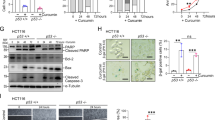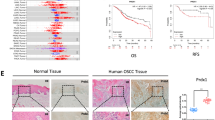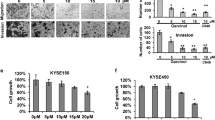Abstract
ΔNp63, the N-terminal truncated isoform of p63, has been found to be overexpressed in several human epithelial cancers, including nasopharyngeal carcinomas (NPCs), suggesting a function in carcinogenesis. Trans-resveratrol (RSV) has been shown to exert proapoptotic activities through a p53-dependent or p53-independent pathway in various cancer cells. However, the effects of RSV on NPC are still unexplored. In this study, we investigated the apoptotic effects of RSV on ΔNp63-overexpressing NPC cell lines. We showed that RSV (12–100 μ) induced dose-dependent growth suppression, cell-cycle arrest in the S phase and caspase-dependent apoptosis in NPC-TW076 and NPC-TW039 cells. The RSV effect was accompanied by the downregulation of ΔNp63 and the upregulation of p53 protein in a dose-dependent manner. By using small-interfering RNA (siRNA) technology, we found that the targeted silencing of ΔNp63 induced apoptosis and sensitized the NPC cells to RSV-induced apoptosis through caspase-3 activation, whereas suppression of p53 by siRNA did not inhibit RSV-induced apoptosis. Furthermore, transfection with p53 siRNA or pretreatment with caspase inhibitors (Z-VAD-fmk or Z-DEVD-fmk) had no influence on the RSV downregulation of ΔNp63. Interestingly, ecoptic expression of ΔNp63 did not significantly block RSV-induced cell death and was also downregulated after RSV treatment. Downregulation of ΔNp63 by RSV was shown to occur at the mRNA transcript and post-translational levels. Importantly, RSV enhanced chemotheraptic drug-induced apoptosis in NPC and two human carcinoma cell lines, HT1376 and Hep3B cells. These results suggested that ΔNp63, but not p53, is a molecular target of RSV-induced apoptosis and the regulation of ΔNp63 expression by RSV may provide a therapeutic effect of RSV in human NPC.
This is a preview of subscription content, access via your institution
Access options
Subscribe to this journal
Receive 12 print issues and online access
$259.00 per year
only $21.58 per issue
Buy this article
- Purchase on Springer Link
- Instant access to full article PDF
Prices may be subject to local taxes which are calculated during checkout









Similar content being viewed by others
References
Crook T, Nicholls J, Brooks L, ON J, Allday MJ . High level expression of Delta N-p63: a mechanism for the inactivation of p53 in undifferentiated nasopharyngeal carcinoma (NPC)? Oncogene 2000; 19: 3439–3444.
Shi W, Bastianutto C, Li A, Perez-Ordonez B, Ng R, Chow KY et al. Multiple dysregulated pathways in nasopharyngeal carcinoma revealed by gene expression profiling. Int J Cancer 2006; 119: 2467–2475.
Chou J, Lin Y-C, Kim J, You L, Xu Z, He B et al. Nasopharyngeal carcinoma—review of the molecular mechanisms of tumorigenesis. Head Neck 2008; 30: 946–963.
Chiang CT, Chu WK, Chow SE, Chen JK . Overexpression of delta Np63 in a human nasopharyngeal carcinoma cell line downregulates CKIs and enhances cell proliferation. J Cell Physiol 2009; 219: 117–122.
Urist MJ, Di Como CJ, Lu M-L, Charytonowicz E, Verbel D, Crum CP et al. Loss of p63 expression is associated with tumor progression in bladder cancer. Am J Pathol 2002; 161: 1199–1206.
Mills AA . p63: oncogene or tumor suppressor? Curr Opin Genet Dev 2006; 16: 38–44.
DeYoung MP, Ellisen LW . p63 and p73 in human cancer: defining the network. Oncogene 2007; 26: 5169–5183.
Moll UM, Slade N . p63 and p73: roles in development and tumor formation. Mol Cancer Res 2004; 2: 371–386.
Muller M, Schleithoff ES, Stremmel W, Melino G, Krammer PH, Schilling T . One, two, three—p53, p63, p73 and chemosensitivity. Drug Resist Updat 2006; 9: 288–306.
Rocco JW, Leong C-O, Kuperwasser N, DeYoung MP, Ellisen LW . p63 mediates survival in squamous cell carcinoma by suppression of p73-dependent apoptosis. Cancer Cell 2006; 9: 45–56.
Hibi K, Trink B, Patturajan M, Westra WH, Caballero OL, Hill D et al. AIS is an oncogene amplified in squamous cell carcinoma. Proc Natl Acad Sci USA 2000; 97: 5462–5467.
Yang A, Kaghad M, Wang Y, Gillett E, Fleming MD, Dotsch V et al. p63, a p53 homolog at 3q27-29, encodes multiple products with transactivating, death-inducing, and dominant-negative activities. Mol Cell 1998; 2: 305–316.
King KE, Ponnamperuma RM, Yamashita T, Tokino T, Lee L, Young M et al. [Delta]Np63[alpha] functions as both a positive and a negative transcriptional regulator and blocks in vitro differentiation of murine keratinocytes. Nature 2003; 22: 3635–3644.
Athar M, Back J, Tang X, Kim K, Kopelovich L, Bickers D et al. Resveratrol: a review of preclinical studies for human cancer prevention. Toxicol Appl Pharmacol 2007; 224: 274–283.
Aziz M, Shannon R, Wu J, Longley BJ, Ahmad N . Chemoprevention of skin cancer by grape constituent resveratrol: relevance to human disease? FASEB J 2005; 421: 277–279.
Jang M, Cai L, Udeani G, Slowing KV, Thomas CF, Beecher CWW et al. Cancer chemopreventive activity of resveratrol, a natural product derived from grapes. Science 1997; 275: 218–220.
Bradamante S, Barenghi L, Villa A . Cardiovascular protective effects of resveratrol. Cardiovasc Drug Rev 2004; 22: 169–188.
Chen JK, Chow S . Antioxidants and myocardial ischemia: reperfusion injuries. Chang Gung Med J 2005; 28: 369–377.
Chow SE, Hshu YC, Wang JS, Chen JK . Resveratrol attenuates oxLDL-stimulated NADPH oxidase activity and protects endothelial cells from oxidative functional damages. J Appl Physiol 2007; 102: 1520–1527.
Howitz KT, Bitterman KJ, Cohen HY, Lamming DW, Lavu S, Wood JG et al. Small molecule activators of sirtuins extend Saccharomyces cerevisiae lifespan. Nature 2003; 425: 191–196.
Valenzano DR, Terzibasi E, Genade T, Cattaneo A, Domenici L, Cellerino A . Resveratrol prolongs lifespan and retards the onset of age-related markers in a short-lived vertebrate. Curr Biol 2006; 16: 296–300.
Fulda S, Debatin K . Resveratrol modulation of signal transduction in apoptosis and cell survival: a mini-review. Cancer Detect Prev 2006; 30: 217–223.
Pervaiz S . Resveratrol: from grapevines to mammalian biology. FASEB J 2003; 17: 1975–1985.
Lin CT, Wong CI, Chan WY, Tzung KW, Ho JK, Hsu MM et al. Establishment and characterization of two nasopharyngeal carcinoma cell lines. Lab Invest 1990; 62: 713–724.
Cheng CC, Wang DY, Kao MH, Chen JK . The growth-promoting effect of KGF on limbal epithelial cells is mediated by u. J Cell Sci 2009; 122: 4473–4480.
Baur J, Sinclair D . Therapeutic potential of resveratrol: the in vivo evidence. Nat Rev Drug Discov 2006; 5: 493–506.
Fulda S, Debatin KM . Sensitization for anticancer drug-induced apoptosis by the chemopreventive agent resveratrol. Oncogene 2004; 23: 6702–6711.
Lee HO, Lee JH, Choi E, Seol JY, Yun Y, Lee H . A dominant negative form of p63 inhibits apoptosis in a p53-independent manner. Biochem Biophys Res Commun 2006; 344: 166–172.
Ratovitski EA, Patturajan M, Hibi K, Trink B, Yamaguchi K, Sidransky D . p53 associates with and targets Delta Np63 into a protein degradation pathway. Proc Natl Acad Sci USA 2001; 98: 1817–1822.
Sayan BS, Sayan AE, Yang AL, Aqeilan RI, Candi E, Cohen GM et al. Cleavage of the transactivation-inhibitory domain of p63 by caspases enhances apoptosis. Proc Natl Acad Sci USA 2007; 104: 10871–10876.
Chu WK, Lee KC, Chow SE, Chen JK . Dual regulation of the DeltaNp63 transcriptional activity by DeltaNp63 in human nasopharyngeal carcinoma cell. Biochem Biophys Res Commun 2006; 342: 1356–1360.
Petitjean A, Cavard C, Shi H, Tribollet V, Hainaut P, Caron de Fromentel C . The expression of TA and [Delta]Np63 are regulated by different mechanisms in liver cells. Oncogene 2004; 24: 512–519.
Joe AK, Liu H, Suzui M, Vural ME, Xiao D, Weinstein IB . Resveratrol induces growth inhibition, S-phase arrest, apoptosis, and changes in biomarker expression in several human cancer cell lines. Clin Cancer Res 2002; 8: 893–903.
Fontecave M, Lepoivre M, Elleingand E, Gerez C, Guittet O . Resveratrol, a remarkable inhibitor of ribonucleotide reductase. FEBS Lett 1998; 421: 277–279.
Guo C, Pan ZG, Li DJ, Yun JP, Zheng MZ, Hu ZY et al. The expression of p63 is associated with the differential stage in nasopharyngeal carcinoma and EBV infection. J Transl Med 2006; 4: 23.
Yip Y, Tsao S . Regulation of P63 expression in primary and immortalized nasopharyngeal epithelial cells. Int J Oncol 2008; 33: 713–724.
Liefer KM, Koster MI, Wang XJ, Yang A, McKeon F, Roop DR . Down-regulation of p63 is required for epidermal UV-B-induced apoptosis. Cancer Res 2000; 60: 4016–4020.
Murray-Zmijewski F, Lane DP, Bourdon JC . p53//p63//p73 isoforms: an orchestra of isoforms to harmonise cell differentiation and response to stress. Cell Death Differ 2006; 13: 962–972.
Bunz F, Hwang PM, Torrance C, Waldman T, Zhang Y, Dillehay L et al. Disruption of p53 in human cancer cells alters the responses to therapeutic agents. J Clin Invest 1999; 104: 263–269.
Sherr CJ . Principles of tumor suppression. Cell 2004; 116: 235–246.
Harmes DC, Bresnick E, Lubin EA, Watson JK, Heim KE, Curtin JC et al. Positive and negative regulation of deltaN-p63 promoter activity by p53 and deltaN-p63-alpha contributes to differential regulation of p53 target genes. Oncogene 2003; 22: 7607–7616.
Waris G, Ahsan H . Reactive oxygen species: role in the development of cancer and various chronic conditions. J Carcinog 2006; 5: 14.
Matés JM, Sánchez-Jiménez FM . Role of reactive oxygen species in apoptosis: implications for cancer therapy. Int J Biochem Cell Biol 2000; 32: 157–170.
Yan W, Chen X . GPX2, a direct target of p63, inhibits oxidative stress-induced apoptosis in a p53-dependent manner. J Biol Chem 2006; 281: 7856–7862.
Zangen R, Ratovitski E, Sidransky D . DeltaNp63alpha levels correlate with clinical tumor response to cisplatin. Cell Cycle 2005; 4: 1313–1315.
Cal C, Garban H, Jazirehi A, Yeh C, Mizutani Y, Bonavida B . Resveratrol and cancer: chemoprevention, apoptosis, and chemo-immunosensitizing activities. Curr Med Chem Anticancer Agents 2003; 3: 77–93.
Boocock D, Faust GE, Patel KR, Schinas AM, Brown VA, Ducharme MP et al. Phase I dose escalation pharmacokinetic study in healthy volunteers of resveratrol, a potential cancer chemopreventive agent. Cancer Epidemiol Biomarkers Prev 2007; 16: 1246–1252.
Acknowledgements
This work was supported by funding from the Chang Gung Memorial Hospital SE Chow (CMRPD 170181) and by a grant from National Science Council to JS Wang (NSC 97-2314-B-182-003-MY3).
Author information
Authors and Affiliations
Corresponding author
Ethics declarations
Competing interests
The authors declare no conflict of interest.
Rights and permissions
About this article
Cite this article
Chow, SE., Wang, JS., Chuang, SF. et al. Resveratrol-induced p53-independent apoptosis of human nasopharyngeal carcinoma cells is correlated with the downregulation of ΔNp63. Cancer Gene Ther 17, 872–882 (2010). https://doi.org/10.1038/cgt.2010.44
Received:
Revised:
Accepted:
Published:
Issue Date:
DOI: https://doi.org/10.1038/cgt.2010.44
Keywords
This article is cited by
-
Resveratrol induces apoptosis by directly targeting Ras-GTPase-activating protein SH3 domain-binding protein 1
Oncogene (2015)
-
Resveratrol induced ER expansion and ER caspase-mediated apoptosis in human nasopharyngeal carcinoma cells
Apoptosis (2014)
-
Wogonin induced apoptosis in human nasopharyngeal carcinoma cells by targeting GSK-3β and ΔNp63
Cancer Chemotherapy and Pharmacology (2011)



